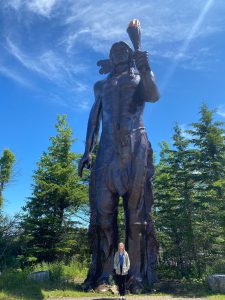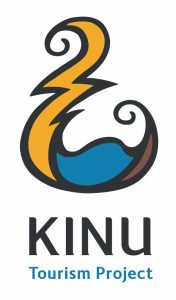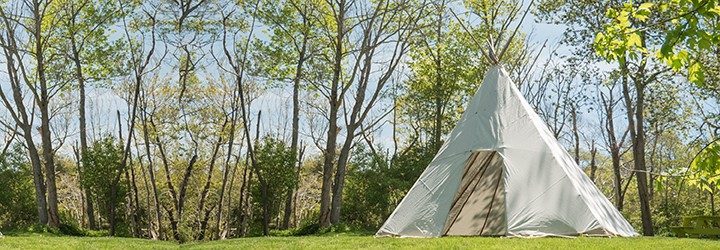Kinu Tourism Project
Pjila’si (Welcome)
The Kinu Tourism Project is based in the unceded, ancestral territory of Mi’kma’ki. Kinu is supported by an Indigenous advisory committee from across the Atlantic region. The project aims to provide an Indigenous informed education for all MSVU Tourism and Hospitality Management students.
Conversations between Catherine Martin and Professor Jennifer Guy inspired the Kinu Tourism Project. In January 2021, the Kinu Tourism Project Executive was formed. In March 2022, The Kinu Tourism Project was funded by the Government of Canada’s Sectoral Initiatives Program. Kinu meaning “us/together” is underpinned by Etuaptmumk (Two-Eyed Seeing) guiding principles.
The Kinu Tourism Project Mi’kma’ki Advisory Committee was formed in January 2023! Our goal when creating the project is to make sure we are connecting with all communities. The Kinu Project Team meets with the Advisory committee regularly to ensure multiple Indigenous voices and perspectives are reflected in the work that we do. Wela’lioq to our advisors for all that they do to support Kinu!
 Members of the Kinu Executive Team and Kinu Project Team Left to right – Scott Daniels, Kelsie Johnston, Bradley Paul, Professor Jennifer Guy, Dr. Peter Mombourquette, Professor Paulette Cormier-MacBurnie, Catherine Martin, Shannon Monk, Robert Bernard, Ann Syliboy.
Members of the Kinu Executive Team and Kinu Project Team Left to right – Scott Daniels, Kelsie Johnston, Bradley Paul, Professor Jennifer Guy, Dr. Peter Mombourquette, Professor Paulette Cormier-MacBurnie, Catherine Martin, Shannon Monk, Robert Bernard, Ann Syliboy.
The Kinu Tourism Project’s main goal is to support authentic Indigenous tourism education and the growth of the Indigenous tourism sector in Mi’kma’ki.
Applying Indigenous-informed approaches and content to the current MSVU Tourism and Hospitality Management Program curriculum will enhance tourism education programming across all output levels (certificate, diploma, and degree) and create a sustainable Indigenous tourism cohort: The Kinu Tourism Project. In addition, the enhancement of the curriculum for all tourism students at MSVU, Kinu will help to build society’s awareness of Indigenous worldviews, ways of knowing, and the true history of Mi’kma’ki.
 Kinu: Phase one of the Kinu Tourism Project was focused on acquiring funding and building the team and structure of Kinu. During the second phase of the project, the Kinu Tourism Project team travelled across Mi’kma’ki to build connections with Mi’kmaw and Wolastoqey communities, tourism professionals, educators, Knowledge Holders, Elders, and others. The aim of this engagement was to learn how the Kinu Tourism Project can best support Indigenous communities’ tourism education needs, what the Kinu course content should include, and to build relationships with Mi’kmaw, Peskamuhkati, and Wolastoqey communities and organizations. Phase three of the Kinu Tourism Project has been focused on student recruitment and course content creation. To create content that is Indigenous-informed, Kinu worked on a study with Dynamic Horizons Innovative Relations (DHIR), led by two Indigenous researchers. The purpose of the study was to explore barriers and facilitators to creating an Indigenous-informed tourism education in Mi’kma’ki.
Kinu: Phase one of the Kinu Tourism Project was focused on acquiring funding and building the team and structure of Kinu. During the second phase of the project, the Kinu Tourism Project team travelled across Mi’kma’ki to build connections with Mi’kmaw and Wolastoqey communities, tourism professionals, educators, Knowledge Holders, Elders, and others. The aim of this engagement was to learn how the Kinu Tourism Project can best support Indigenous communities’ tourism education needs, what the Kinu course content should include, and to build relationships with Mi’kmaw, Peskamuhkati, and Wolastoqey communities and organizations. Phase three of the Kinu Tourism Project has been focused on student recruitment and course content creation. To create content that is Indigenous-informed, Kinu worked on a study with Dynamic Horizons Innovative Relations (DHIR), led by two Indigenous researchers. The purpose of the study was to explore barriers and facilitators to creating an Indigenous-informed tourism education in Mi’kma’ki.
Kinu Students: The first group of Indigenous students is starting their Kinu Tourism education in September 2024. Students can study remotely from their community or in-person at MSVU, in Kjipuktuk (Halifax), Nova Scotia. Interested applicants should contact Kinu@msvu.ca for more information and to have the application fee waived.


